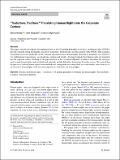“Traduttore, traditore?” Translating human rights into the corporate context
Abstract
This paper critically investigates the implementation of the UN guiding principles on business and human rights (UNGPs) into the corporate setting through the concept of ‘translation’. In the decade since the creation of the UNGPs, little academic research has focussed specifically on the corporate implementation of human rights. Drawing on qualitative case studies of two multinational corporations—an oil and gas company and a bank—this paper unpacks how human rights are translated into the corporate context. In doing so, the paper focuses on the “resonance dilemma” translators encounter, the strategies used to make human rights understandable and palatable, and the difficulties that emerge from this process. We contend that the process of making human rights understandable and manageable can change their form and content, which may act as an obstacle to human rights realisation and corporate accountability for human rights.
Citation
McVey , M , Ferguson , J & Puyou , F-R 2022 , ' “Traduttore, traditore?” Translating human rights into the corporate context ' , Journal of Business Ethics , vol. Online First . https://doi.org/10.1007/s10551-021-05028-3
Publication
Journal of Business Ethics
Status
Peer reviewed
ISSN
0167-4544Type
Journal article
Description
This research is part of a larger PhD studentship Grant, which is funded by the Scottish Graduate School of Social Science (SGSSS) and the Institute of Chartered Accountants Scotland (ICAS).Collections
Items in the St Andrews Research Repository are protected by copyright, with all rights reserved, unless otherwise indicated.

